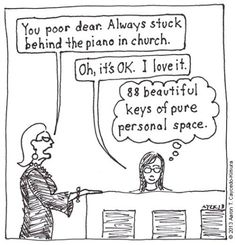When I last posted, I was trying to show that there is life after something like this. With God, everything is possible, but with complete honesty, we are still struggling. To some, I imagine that this seems like a little crazy. Just get one with it!
The church situation that started all this, has, in a sense, resolved itself. But not in the way I thought it would. As hard as we tried, my husband and I just could not return to our congregation and family. We severed ties, amicably, but severed nonetheless. We have been visiting many congregations and though all have something to offer, we are finding it hard to find out place again.
Now is where the fear begins. I’m beginning to wonder if I will ever find another place I will feel at home in. What doesn’t help is that churches, in general, are changing in a way that my husband and I find distressing. Let me explain. We are conservative folks. We like hymnals, pews and organs. We like a traditional service. The worship experience in many of the churches we have visited is decidedly more modern. Not that it will be a deal killer, but unfortunately, many that we have visited like to use popular Christian songs as their worship music. Much of the congregation struggles to sing along (even in the bigger churches) because most people aren’t professional singers. To musicians like us, its very distracting. When they throw in an older hymn for good measure, the congregation sings wonderfully. I would think that would be a clue, but I guess it isn’t. If it stopped there, it would be distracting, but ok. But it doesn’t. With the sermon that follows, it varies. Some do a relatively good job of digging into the scripture, but others are more topical and I find myself walking away wondering what just happened. I know bigger churches rely on their Sunday School time (now called other things in modern churches) to get into the meat of the Bible. But in our tradition, the sermon is much more of a learning experience than a “feel good” one. So then when Sunday rolls around I wonder if I really want to go back.
Living in a fairly small city, I run into several people I know at the churches. I find that comforting, but I am still not feeling like I can commit. The more conservative churches we have visited have their own issues that make me reticent to get into that. But then I ask myself. Am I being one of “those” people? Fault finding with all churches? No church is perfect. It took us 8 years to find the congregation we eventually joined and were there nearly 15 years. I know this won’t happen overnight. But now I am wondering, will I ever be able to commit to another church? Has the modern church become so watered down and the huge gaping chasm between what an actual Biblical congregation is and what we now have in modern America become so wide, that we will never be able to find somewhere we feel comfortable with? Are the conservative churches so conservative that I don’t feel at home there either?
Looking for suggestions for churches is really no help either. People want you to come to their church because everyone thinks their church is the best. Most are really not able to make a critical evaluation of your own needs. Nor should they. That isn’t their responsibility. But it isn’t helpful. So Sunday rolls around and you decide yet one more time to stay home, watch sermons on TV and other people enjoying church while you sit at home. To add to the problem, with health issues, putting myself through that anxious feeling every Sunday is enough to make me want to stay put and not go through it again. So then the time between going to church and not gets bigger and bigger. You find yourself wanting less and less to go to church. You don’t even think about staying home. The guilt of it wanes and you find yourself a Christian who doesn’t go to church. When did it happen?






